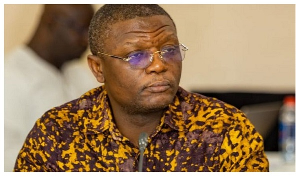Article: Nii Moi Thompson
Just as we thought we had all the answers, history – and Tunisia – suddenly changed all the questions.
And now we must start all over again - promoting economic growth not as an end itself but as a means to fostering equity and social justice, the bedrock of sustainable national development.
For most of Africa, post-independence economic growth was characterized by a u-shape made up of high growth rates in the early years, followed by the collapse of the 1970s and '80s, and then adjustment and recovery from the 1990s onwards.
The recovery engendered high and positive economic growth rates, as measured by changes in the Gross Domestic Product (GDP), but few analysts paused to ask whether such growth was helping, or hurting, its intended beneficiaries.
Ghana proved somewhat the exception, with the realization in the 1980s of growing poverty and the subsequent adoption of a Programme of Actions to Mitigate the Social Cost of Adjustment (PAMSCAD).
But the program had a mixed record of implementation, in part because of shortfalls in donor support and weak implementation design.
GDP growth meanwhile continued to be the dominant if not the sole measure of economic progress. Growth has averaged 5.0% per year since the Economic Recovery Programme of 1983, reaching nearly 8.4% in 2008 before tapering off to 4.7% in 2009 in line with the slowdown of the global economy.
Criticism of this one-dimensional approach to growth has come from many quarters, notably the Trades Union Congress, whose ranks have steadily shrunk over the period amidst rising unemployment and stagnant earnings.
In effect, Ghana has had jobless growth.
Although overall poverty levels are said to have steadily fallen since the 1980s, inequality has risen simultaneously, reflecting an uneven distribution of the benefits of growth. The Gini coefficient, a measure of inequality, rose from 37.3 in 1992 to 38.8 in 1999 to 39.4 in 2006, according to the National Development Planning Commission.
The situation is worse in the rural areas, where poverty increased over the period even as the latest survey by the Ghana Statistical Service shows an overall decline. Food crop farmers remain the poorest in the country, followed by cash crop farmers.
The divergence between impressive long-term growth rates and rosy current macro-economic statistics, on the one hand, and what seems like a deterioration of the social basis of that growth, on the other, should worry any serious policy maker, especially in view of recent global developments.
For a host of reasons, reactions in other countries to the divergence between growth and social progress will differ, but whatever form they take, they would always constitute a disruption to the social order. It is time, therefore, to redefine ‘economic growth” beyond mere changes in GDP to incorporate the simultaneous measure of growth in net job creation as well as real household earnings that result from that growth (At the technical level, this may be known as the Composite Index of Economic Growth (CIEG), of which GDP would only be a part).
The CIEG may not address all the limitations of the one-dimensional approach to growth (no single statistic can), but it will surely offer better insights into development policies and their short-term effectiveness in laying the groundwork for long-term growth and development.
Here are the possible ingredients of this broader alternative to economic growth:
GDP: There are three main approaches to measuring GDP, namely: Goods and services produced (output) in the country; the total expenditure by households, government, businesses and foreigners on those goods and services; and the income derived by households and firms from the production of those goods and services.
Ghana has traditionally used the “output” approach, but the recent revision of GDP by the Statistical Service reintroduced the “expenditure” approach (suspended due to some technical challenges) and offers a framework for the calculation and reporting of the income-based approach.
This "triangulated" approach to measuring economic growth means better understanding of the sources and implications of growth. Under theexpenditure approach, for example, patterns, trends and spatial distribution of business investment help in the promotion of balanced growth, nationally. Similarly, developments in household spending give early hints of trends in poverty before more comprehensive surveys of living standards are conducted.
Employment: To guard against jobless growth – which tends to create an illusion of progress and hides festering social discontent – production processes must be planned to be labor-intensive. That, among other things, requires the existence of a comprehensive labor market information system, which has not existed for decades despite the obvious necessity of having one. Comprehensive policies that address labor supply issues like low education and poor skills as well as improved working conditions to ensure the safety, dignity and satisfaction of the Ghanaian worker must also be pursued.
On the labor-demand side, strategies to stimulate the growth of small-and-medium scale enterprises are essential. Using Small Business Associations (SBAs), these enterprises can be exposed to best business practices for increased productivity and profitability. Expansion of existing businesses from growing profits and the creation of new ones in an improved business climate is critical to the creation of adequate employment opportunities and the ultimately eradication of poverty. Initiatives such as the National Youth Employment Programme, already politicized to the point of near paralysis, are at best palliatives to a problem that requires an economy-wide solution.
Earnings: As with employment, there are no systematic national statistics on earnings, especially at the household level. This makes it difficult, if not impossible, to formulate meaningful polices to ensure adequate growth in household incomes. In the absence of a legal enforcement mechanism, the annual ritual of setting the minimum wage remains more of an academic exercise than a genuine effort at bettering the lot of the Ghanaian worker. Initiatives like the Single Spine Salary Structure, along with the Fair Wages Commission, deal principally with the public sector, which makes up less than 10.0% of the labor force.
The case for a more comprehensive effort at measuring household earnings, therefore, has become more compelling than ever before.
Parallel to this composite effort at economic growth should be policies to ensure equity (or inclusiveness) across economic sectors, socio-economic groups, and of course administrative regions.
This is the minimum that Ghana ought to do to ensure that economic growth benefits the greatest number of people and creates a solid foundation for equitable and sustainable national development.
Credit: Nii Moi
Opinions of Friday, 29 April 2011
Columnist: Thompson, Nii-Moi


















